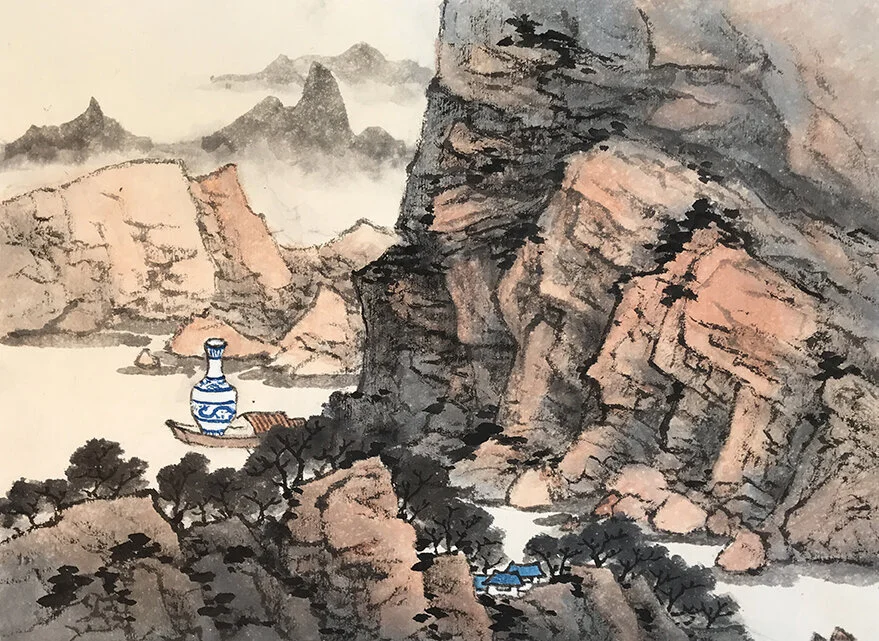Islamic Blue
Freda Lee-McCann
September 29 through October 23, 2021
In our joint show, Langley Spurlock and I chose “Blue” as the theme. We each chose a path from there. I chose the “Blue” used in Chinese blue and white ceramics. There is a lot of very interesting history to this blue, and it is this history that inspired my work. The Chinese called the cobalt blue used in their beautiful ceramics Hui-Hui Ching, which refers to the “Hui people” who were the Islamic peoples of central Asia; and so, I called this color “Islamic Blue”. This cobalt pigment is one of the few that can withstand the extremely high firing temperatures required for porcelain. The blue and white ceramics became known as early as the 7th century CE, and were made possible by the export of cobalt oxide from Persia along the Silk Road. This pigment was very precious and worth twice its weight in gold.
The first Chinese blue and white ceramics were produced in or around the seventh century CE in Jing-de of Henan province during the Tang dynasty (7th to 10th century). The Chinese of that time had a very advanced kiln design and constructed kilns capable of firing 12,000-15,000 pieces at a time. An indication of the popularity of these ceramics and their importance in trade was the discovery of a ship wreck off the coast of Indonesia that dates back to the 9th century CE in which 70,000 ceramic items were found! From the 14th to the 16th century, these blue and white ceramics were extremely popular in China as well as outside China. Massive production of this fine, translucent, blue and white porcelain was exported via the Silk Roads by the Muslim traders to Central Asia and the West.
From the 2nd century BCE to the 18th century CE the Silk Roads formed a network of trade routes on both land and sea that connected the East and West. These routes connected East Asia with south Asia, Persia, the near East, Africa and on into southern Europe. Silk was the major export from China for trade from the Han Dynasty (207 BCE-200 CE) onward. Beginning in the 16th century CE, a large Chinese export trade with Europe developed, and the blue and white ceramics were exported to Europe in massive quantities. However, much of these “export” ceramics were rather low quality but showy in style.
In my work shown here, I used only one large piece of ceramic to represent the 70,000 pieces in transit to either Europe or central Asia. Since the Silk Road included both land and sea routes, my ceramics also appear on both sea and land. Just for fun, I also thought maybe there are many present-day things known to us in plastic, paper or metal that could be made into beautiful blue and white ceramic pieces as decorations.
All the way to Europe
Freda Lee-McCann
Ink & watercolor on rice paper
15 x 11 in.
$400
Click image to enlarge ⦿ Inquire
A Wonderful World
Freda Lee-McCann
Acrylic on Canvas
12 x 12 in.
$400
Click image to enlarge ⦿ Inquire
Also by Sea
Freda Lee-McCann
Acrylic on Canvas
20 x 16 in.
Click image to enlarge ⦿ Sold
Silk Road by the Sea
Freda Lee-McCann
Ink & watercolor on rice paper
11 x 15 in.
$400
Click image to enlarge ⦿ Inquire
The Song of Landscape
Freda Lee-McCann
Ink & watercolor on rice paper
15 x 11 in.
$425
Click image to enlarge ⦿ Inquire
Silk Road I
Freda Lee-McCann
Ink & watercolor on rice paper
11 x 15 in.
$375
Click image to enlarge ⦿ Inquire
Good Dinner?
Freda Lee-McCann
Ink & watercolor on rice paper
16 x 8 in.
$350
Click image to enlarge ⦿ Inquire
Silk Road II
Freda Lee-McCann
Acrylic on canvas
24 x 12 in.
$650
Click image to enlarge ⦿ Inquire
We can be pretty too
Freda Lee-McCann
Ink & watercolor on rice paper
16 x 8 in.
$350
Click image to enlarge ⦿ Inquire
Prosperity
Freda Lee-McCann
Ink & watercolor on rice paper
19 x 14.5 in.
$500
Click image to enlarge ⦿ Inquire
Long Life
Freda Lee-McCann
Ink & watercolor on rice paper
18.5 x 15 in.
$500
Click image to enlarge ⦿ Inquire
Where Am I?
Freda Lee-McCann
Acrylic on canvas
20 x 16 in.
$650
Click image to enlarge ⦿ Inquire
Happiness
Freda Lee-McCann
Ink & watercolor on rice paper
11 x 15 in.
$375
Click image to enlarge ⦿ Inquire

